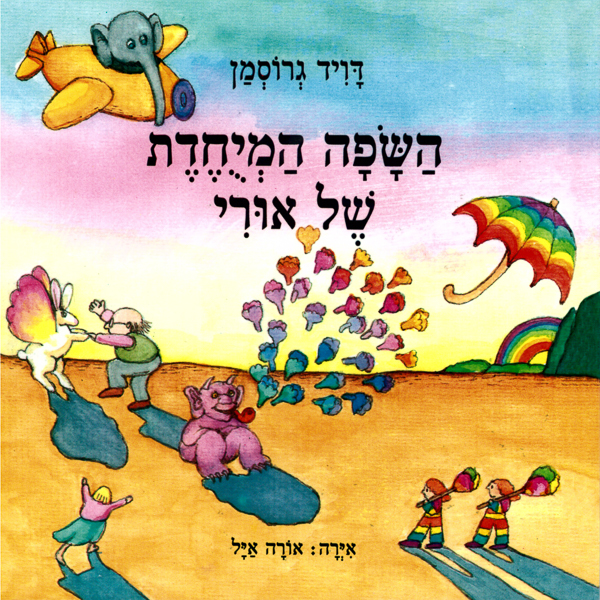השפה המיוחדת של אורי
דויד גרוסמן
תרגום לרוסית של ההצעות להורים המודפסות בדפים האחרונים של הספר
Особый язык Ури
Давид Гроссман
Дорогие родители!
Малышу Ури почти два года, и он говорит на своем особом языке. Даже маме и папе не всегда удается понять его! Только Ионатан, его старший брат, понимает его. Каким образом именно Ионатану удается переводить с особого языка Ури?
Есть вещи, которые могут понять только братья. Может быть, причина этого в том, что в детстве они смотрят на мир одинаково, и не так, как их родители. Может быть, потому что у них есть время слушать и смотреть, тогда, как их родители заняты или озабочены чем-либо. А может быть, здесь сказываются особенные узы дружбы между братьями и сестрами. Иногда брат или друг могут понять ребенка и его мысли там, где родителям это не удается.
«И он будет тебе устами»
В Торе говорится, что Мошерабейну был «тяжелоуст и косноязычен» (Шемот, 4,10). Когда Моше был избран предводителем народа Израиля, он опасался, что ему будет трудно объясняться. Бог приказал ему воспользоваться помощью старшего брата Аарона, который любил его: «И как увидит тебя, возрадуется в сердце своем … И он будет говорить вместо тебя с народом…И он будет тебе устами»(Шемот,4, 14-17). Тора рассказывает нам, что Аарон был рад помочь своему младшему брату Моше и вместе с ним встать во главе народа во время исхода из Египта и в пустыне.
«Особый язык Ури» - это книжка, с которой начинается учебный год в «Пижамной библиотечке». Мы приглашаем всех членов семьи, и особенно братьев и сестер вместе получить удовольствие от нее и постараться понять, что говорит Ури.
Приятного чтения!
Предложения для занятий в кругу семьи
- Каждый член семьи Ури предлагает разные варианты , как понять слова Ури. Эти смешные предположения проиллюстрировала художница Ора Эяль. Можно вместе рассмотреть иллюстрации и предложить детям выбрать одну из них и вместе с ними нарисовать свой вариант такого понимания.
- Ионатан слышит половину слова и понимает, что имеет в виду Ури. Предложите детям стать «переводчиками». Посмотрите вокруг и выберите какой-нибудь предмет, который находится в комнате. Назовите только первую часть названия этого предмета. «Переводчик» должен попытаться угадать, какой предмет вы имеете в виду. Потом можно поменяться ролями.
- О Ионатане, которому пять лет, говорится, «что это точно посередине между быть маленьким и быть большим». Это возможность побеседовать с детьми о том, когда приятно быть маленькими, а когда хорошо быть большими.
- Братья могут помогать друг другу в любом возрасте. Вы можете рассказать детям о событиях, пережитых в детстве вместе с братьями или сестрами. Дедушки и бабушки тоже могут рассказать о своих братьях и сестрах.
- Можно побеседовать с детьми о Моше и Аароне. Как по их мнению чувствовал себя Моше, когда Аарон был «его устами», то есть, говорил вместо него? А как чувствовал себя Аарон, когда был призван стать одним из лидеров народа? С помощью двух старых кусочков материи и простых деталек ваши дети могут сделать кукол и попробовать инсценировать отношения между Моше и Аароном.
- Иллюстрации забавных интерпретаций членов семьи показывают, что даже ошибки могут помочь изобрести что-то интересное. Знаете ли вы кого-нибудь, кто из-за своей ошибки обнаружил что-то новое, о чем он даже не думал? Интересно побеседовать об этом с детьми.
- Почти все помнят первые слова, которые изобретали наши дети, когда учились говорить. Помните ли вы такие слова? Вашим детям, конечно, будет интересно их услышать. Вы можете записать их здесь, чтобы запомнить:
_______________________________________________________
_______________________________________________________





